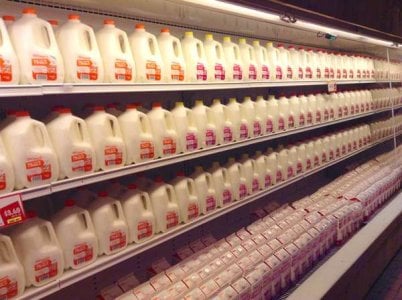Do you trust the 'sniff test'? UK supermarket chain eliminates milk use-by-dates
Once upon a time, our trusty noses served as guides when it came to assessing the fate of that carton of milk tucked away at the back of the fridge. We relied on our prowess to sniff out whether it was fit for our cherished morning cuppa or destined for the sink.
But hold onto your hats, folks, because in a surprising blast from the past, a well-known British supermarket has decided to bring back this age-old tradition.
Marks & Spencer, a much-loved UK chain, has recently taken the bold step of removing use-by-dates from its milk packaging to reduce food wastage.
Instead, it has introduced best-before labels that give customers a better idea of when the milk's freshness might decline, leaving it up to us—and our noses—to determine if the milk is still safe for consumption.

The supermarket recently announced a development in milk processing technology, allowing shoppers to trust their own senses and judgement instead of relying solely on use-by-dates. This exciting advancement has garnered praise from the Waste and Resources Action Programme (WRAP), a well-known sustainability charity.
WRAP's director of collaboration and change, Catherine David, said, 'M&S is instantly helping its customers save money and cut waste by giving them more time to consume the milk they buy.'
This change could potentially have an impact on the staggering 278 million litres of milk wasted annually, primarily because it is not consumed before the use-by date.
If the sniff test brings back memories of times gone by and inspires you to trust your senses again, do proceed with caution. The Food Standards Agency (FSA) of the UK advises customers to rely on their judgement only if the packaging displays a best-before date.

In cases where the product has a use-by date, it is safer to stick to that information, as the sniff test isn't always reliable in detecting harmful bacteria.
M&S isn't the first company to advocate for best-before labels; last year, international supermarket chain Morrisons swapped out use-by dates on their milk bottles, while Scandinavian dairy company Arla made a similar change in 2019.
The shift in labelling applies to Marks & Spencer's RSPCA Assured Select Farms British and organic fresh milk. It comes as part of the supermarket's broader sustainability plan, which includes removing best-before dates from over 300 fruit and vegetable lines in an effort to halve its food waste by 2030 and achieve net-zero status by 2040.
 For those who still value their instinct for sniffing out milk-related freshness, this change can be a welcome return to simpler times. Just always remember to follow food safety guidelines and trust your sense of smell.
For those who still value their instinct for sniffing out milk-related freshness, this change can be a welcome return to simpler times. Just always remember to follow food safety guidelines and trust your sense of smell.
Members, what are your thoughts on Mark and Spencer's decision to embrace the nostalgic practice of relying on our sense of smell to assess the freshness of milk, while still prioritising food safety guidelines? How would you feel if this change was brought to Australia?
But hold onto your hats, folks, because in a surprising blast from the past, a well-known British supermarket has decided to bring back this age-old tradition.
Marks & Spencer, a much-loved UK chain, has recently taken the bold step of removing use-by-dates from its milk packaging to reduce food wastage.
Instead, it has introduced best-before labels that give customers a better idea of when the milk's freshness might decline, leaving it up to us—and our noses—to determine if the milk is still safe for consumption.

Marks & Spencer, the British supermarket chain, has recently made an interesting decision regarding the use-by-dates on some of its milk bottles. Image from Flickr
The supermarket recently announced a development in milk processing technology, allowing shoppers to trust their own senses and judgement instead of relying solely on use-by-dates. This exciting advancement has garnered praise from the Waste and Resources Action Programme (WRAP), a well-known sustainability charity.
WRAP's director of collaboration and change, Catherine David, said, 'M&S is instantly helping its customers save money and cut waste by giving them more time to consume the milk they buy.'
This change could potentially have an impact on the staggering 278 million litres of milk wasted annually, primarily because it is not consumed before the use-by date.
If the sniff test brings back memories of times gone by and inspires you to trust your senses again, do proceed with caution. The Food Standards Agency (FSA) of the UK advises customers to rely on their judgement only if the packaging displays a best-before date.

It's important to note that relying solely on the sniff test may not always guarantee food safety. Image by Anna Shvets from Pexels
In cases where the product has a use-by date, it is safer to stick to that information, as the sniff test isn't always reliable in detecting harmful bacteria.
M&S isn't the first company to advocate for best-before labels; last year, international supermarket chain Morrisons swapped out use-by dates on their milk bottles, while Scandinavian dairy company Arla made a similar change in 2019.
The shift in labelling applies to Marks & Spencer's RSPCA Assured Select Farms British and organic fresh milk. It comes as part of the supermarket's broader sustainability plan, which includes removing best-before dates from over 300 fruit and vegetable lines in an effort to halve its food waste by 2030 and achieve net-zero status by 2040.
Key Takeaways
- Marks & Spencer has removed use-by dates on some milk bottles, replacing them with best-before indicators in an effort to reduce food wastage.
- The UK government’s Food Standards Agency says the type of label required for milk products varies across companies and depends on the degree of processing and microbiological risk assessment.
- Sustainability charity Waste and Resources Action Programme praises the supermarket chain, as an estimated 278 million litres of milk is wasted annually, mostly due to unmet use-by dates.
- Marks & Spencer aims to halve its food waste by 2030 and reach net-zero by 2040.
Members, what are your thoughts on Mark and Spencer's decision to embrace the nostalgic practice of relying on our sense of smell to assess the freshness of milk, while still prioritising food safety guidelines? How would you feel if this change was brought to Australia?







